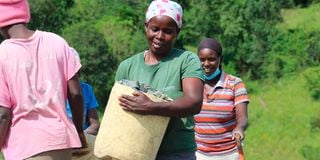The brave women of Chepalungu's all-female quarry

Lilian Lang'at (forefront) with other women in the background working at the Kapmunduki quarry site on May 10, 2024.
What you need to know:
- In Kapmunduki village, Bomet County, an all-women quarry provides a crucial livelihood for single mothers and married women.
- Despite facing challenges like poor road conditions and lack of protective gear, these women crush stones daily.
- Their resilience in a traditionally male-dominated field highlights both their determination and the urgent need for better infrastructure and support in their community.
The air in Kapmunduki village, Chepalungu Constituency, Bomet County, reverberates with the din of hammers crushing stones, accompanied by clouds of dust kicked up by the labour. This scene attracts the attention of motorists and passers-by on the nearby road.
At first glance, one might assume these are men engaged in the traditional labour-intensive and energy-sapping work of a quarry. However, a closer look reveals that the stone crushers spread across the two-acre quarry land are women, breaking a sweat to eke out a living for their families.
The majority of these women are single parents, fending for their children, while others are married, with their partners engaged in casual jobs elsewhere.
Not only is the workforce entirely female, but the quarry itself, nicknamed Kap Kata, is owned by Sally Munai – a woman who is on-site, supervising the work, lending a hand, and haggling over prices with customers.
"Many women turn up every morning to crush stones for a living. They use the proceeds to feed and educate their children," says Sally.
She notes that the more than 10 women at the site have proved the old adage that what a man can do, a woman can do as well, if not better.
For a 20kg tin of crushed stones, the women are paid Sh10. It takes a week for an individual to fill a tipper truck, which carries 550 tins on a full load.
“To fill up a tipper, one earns Sh5,500, and it takes a hard week's work for an individual to attain that feat. But when they do it in groups, in a merry-go-round arrangement, which happens a lot, it takes them a minimum of two and a maximum of three days," explains Sally.
A tipper truck of quarry stones is sold for Sh10,000, a price adjusted a month ago from the previous Sh9,500.

Sally Munai, the owner of a quarry that engages an all-women workforce at Kapmunduki village in Chepalungu Constituency, Bomet County in this photo taken on May 10, 2024.
"Men passing by, especially visitors, are mesmerised by the determination of the women crashing stones all day long. This is the only constant source of livelihood for the women in the region," says Sally.
The stones are used as construction materials for housing units in Bomet, Narok, and Kericho counties.
Sally has been operating the quarry for more than ten years and has been able to educate her children. She is currently supporting two of her grandchildren in secondary schools in the area.
"A few years ago, I invited women to the site and prevailed upon them to help me excavate and crush the stones so as to earn a living instead of staying idle and looking up to men to feed their families," she says.
Initially, a few women responded positively, but the numbers increased over time as they realised it was not exclusively a man's job.
"Operating an all-women quarry is easy because we have common interests and problems, which we help each other solve. We understand what it takes to bring a family from a poor background and face the challenges that come with it head-on," explains Sally.
"Most of us did not have the opportunity to pursue formal education beyond primary school, but we work hard for a living. At least we are not beggars, and this has enabled us to put food on the table for our families," adds Priscah Langat, one of the women working at the quarry.

Judy Cherotich busy crushing stones at a quarry at Kapmundui village on May 10, 2024.
Judy Cherotich, a resident of the nearby Kimaiya village, says without the quarry, she would not be able to provide for her family and would probably be moving around the village for manual jobs.
"This job, hard as it may be, has enabled me to send my children to school, pay for their treatment whenever they fall sick, and provide them with food, just like any other person engaged in formal or informal employment in the society," she says.
Judy, a determined mother of three, found herself turning to the unforgiving work of crushing stones at the local quarry two years ago. In her rural community, plagued by a lack of industries and poor infrastructure, job opportunities were scarce. The quarry became her lifeline, offering a harsh but necessary means to support her family in an area where economic prospects are as fragmented as the rocks she breaks each day.
Armed with hammers, shovels, and worn-out plastic tins curved from used 20-litre jerrycans, the women religiously report to the quarry from Monday to Saturday, taking their Sunday break to go to church and deal with their pending domestic chores.

Rose Kirui works at the quarry site in Kapmunduki village, Chepalungu Constituency, Bomet County on May 10, 2024.
"Sunday is a day to rest for all of us. We do not recognise public holidays, as unlike those in formal employment, no one pays us in the informal (jua kali) sector to take a break," says Rose Kirui, another quarry worker.
"The challenges we were faced with at the family front for lack of resources have eased over time after I got engaged in this work. I am able to buy foodstuffs, clothing, and pay fees for my school-going children," adds Rose as she wipes pearls of sweat from her forehead while crushing the stones.
Due to a lack of protective gear, the women are highly susceptible to respiratory diseases, often requiring frequent visits to local pharmacies and health centres for treatment. Additionally, the poor condition of the Siongiroi-Olbutyo-Kapkwen road has caused a decline in customer orders at the site over the past year. The road's difficult terrain makes it challenging for lorries to navigate, resulting in numerous trucks getting stuck for several days.
The women stone crushers of Chepalungu face significant challenges in their work, with poor road conditions being a major obstacle.

Betty Kirui, taking a break in the course of crushing stones at the Kapmunduki village quarry on May 10, 2024.
Betty Kirui explains, "We've repeatedly urged our Member of Parliament (MP) to push the Kenya Rural Roads Authority to repair the road. Better access would attract more customers."
During rainy seasons, the road becomes impassable, leading to a scarcity of orders. Consequently, the women, whose income depends on fulfilled orders, often go without pay for days.
Although the MP recently promised road repairs would begin after the heavy rains and floods subsided, no reconstruction had started as of this report.
Lilah Siele, a local woman leader and businesswoman, advocates for both government and private sector support.
"The government should provide these women with stone-crushing equipment to increase efficiency and commercial viability," she suggests.
"This would also create more employment opportunities."
Lilah emphasises the need for proper protective gear to ensure worker safety and reduce environmental pollution and respiratory diseases.
Peter Kiprotich, a youth leader in Bomet, commends the women's resilience in this traditionally male-dominated field.
"These women have shown remarkable strength, working through harsh weather conditions to prepare stones for construction sites across the region. They deserve our full support," he states.
Peter, who resides in Siongiroi Ward, adds that the women urgently need safety equipment such as aprons, gloves, gumboots, headgear, goggles, and masks to prevent injuries and health issues.
Once the stones are crushed, men waiting at the site take over the task of loading the finished product onto trucks, providing an additional source of local employment.





